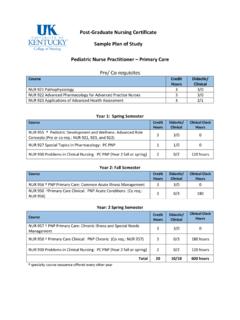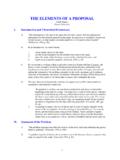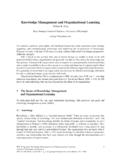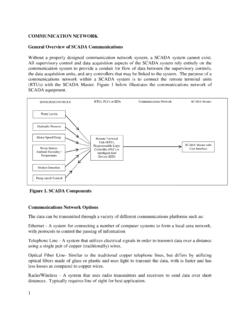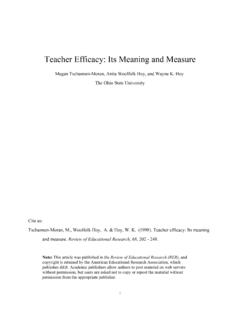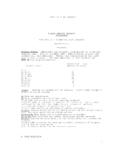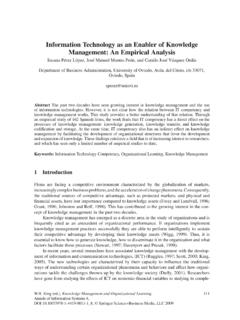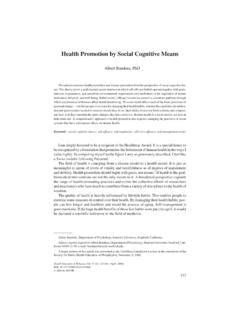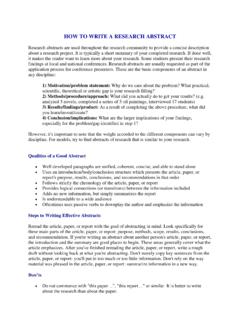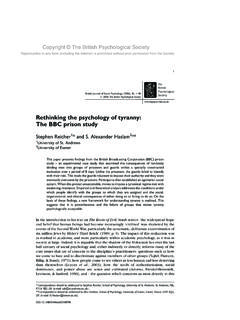Transcription of GUIDE FOR CONSTRUCTING SELF-EFFICACY SCALES
1 SELF-EFFICACY Beliefs of Adolescents, 307 337 Copyright 2005 by Information Age PublishingAll rights of reproduction in any form FOR CONSTRUCTING SELF-EFFICACY SCALESA. BANDURAA lbert BanduraPerceived SELF-EFFICACY is concerned with people s beliefs in their capabili-ties to produce given attainments (Bandura, 1997). One cannot be allthings, which would require mastery of every realm of human life. Peoplediffer in the areas in which they cultivate their efficacy and in the levels towhich they develop it even within their given pursuits. For example, abusiness executive may have a high sense of organizational efficacy butlow parenting efficacy . Thus, the efficacy belief system is not a global traitbut a differentiated set of self -beliefs linked to distinct realms of function-ing.
2 Multidomain measures reveal the patterning and degree of general-ity of people s sense of personal is no all-purpose measure of perceived SELF-EFFICACY . The onemeasure fits all approach usually has limited explanatory and predictivevalue because most of the items in an all-purpose test may have little orno relevance to the domain of functioning. Moreover, in an effort to serveall purposes, items in such a measure are usually cast in general termsdivorced from the situational demands and circumstances. This leavesmuch ambiguity about exactly what is being measured or the level of taskand situational demands that must be managed. SCALES of perceived self -CHAPTER 14308 A. BANDURA efficacy must be tailored to the particular domain of functioning that isthe object of efficacy beliefs are multifaceted, social cognitive theoryidentifies several conditions under which they may co-vary even acrossdistinct domains of functioning (Bandura, 1997).
3 When differentspheres of activity are governed by similar sub-skills there is some inter-domain relation in perceived efficacy . Proficient performance is partlyguided by higher-order self -regulatory skills. These include genericskills for diagnosing task demands, CONSTRUCTING and evaluating alterna-tive courses of action, setting proximal goals to GUIDE one s efforts, andcreating self -incentives to sustain engagement in taxing activities and tomanage stress and debilitating intrusive thoughts. Generic self -manage-ment strategies developed in one realm of activity are serviceable inother activity domains with resulting co-variation in perceived efficacyamong them. Co-development is still another correlative process. Even if differentactivity domains are not sub-served by common sub-skills, the same per-ceived efficacy can occur if development of competencies is sociallystructured so that skills in dissimilar domains are developed example, students are likely to develop similarly high perceived SELF-EFFICACY in dissimilar academic subjects, such as language and mathe-matics in superior schools, but similarly low perceived efficacy in inef-fective schools, which do not promote much academic learning in anysubject finally, powerful mastery experiences that provide striking testi-mony to one s capacity to effect personal changes can produce a transfor-mational restructuring of efficacy beliefs that is manifested across diverserealms of functioning.
4 Extraordinary personal feats serve as conceptual and methodological issues regarding the nature andstructure of SELF-EFFICACY SCALES are discussed in detail in Chapter 2 in thebook SELF-EFFICACY : The Exercise of Control and will not be reviewed here. Thepresent GUIDE for CONSTRUCTING SELF-EFFICACY SCALES supplements that con-ceptual and empirical ValidityEfficacy items should accurately reflect the construct. SELF-EFFICACY isconcerned with perceived capability. The items should be phrased interms of can do rather than will do. Can is a judgment of capability; willis a statement of intention. Perceived SELF-EFFICACY is a major determi- GUIDE for CONSTRUCTING SELF-EFFICACY SCALES 309nant of intention, but the two constructs are conceptually and empiri-cally separable.
5 Perceived SELF-EFFICACY should also be distinguished from other con-structs such as self -esteem, locus of control, and outcome expectancies. Perceivedefficacy is a judgment of capability; self -esteem is a judgment of self -worth. They are entirely different phenomena. Locus of control is con-cerned, not with perceived capability, but with belief about outcome con-tingencies whether outcomes are determined by one s actions or byforces outside one s control. High locus of control does not necessarilysignify a sense of enablement and well-being. For example, students maybelieve that high academic grades are entirely dependent on their perfor-mance (high locus of control) but feel despondent because they believethey lack the efficacy to produce those superior academic important distinction concerns performance outcome expec-tations.
6 Perceived SELF-EFFICACY is a judgment of capability to execute giventypes of performances; outcome expectations are judgments about theoutcomes that are likely to flow from such performances. Outcome expec-tations take three different forms (Bandura, 1986). They include the posi-tive and negative physical, social, and self -evaluative outcomes. Withineach form, the positive expectations serve as incentives, the negative onesas disincentives. The outcomes people anticipate depend largely on theirjudgments of how well they will be able to perform in given situations. Perceived efficacy plays a key role in human functioning because itaffects behavior not only directly, but by its impact on other determinantssuch as goals and aspirations, outcome expectations, affective proclivities,and perception of impediments and opportunities in the social environ-ment (Bandura, 1995, 1997).
7 efficacy beliefs influence whether peoplethink erratically or strategically, optimistically or pessimistically. They alsoinfluence the courses of action people choose to pursue, the challengesand goals they set for themselves and their commitment to them, howmuch effort they put forth in given endeavors, the outcomes they expecttheir efforts to produce, how long they persevere in the face of obstacles,their resilience to adversity, the quality of their emotional life and howmuch stress and depression they experience in coping with taxing envi-ronmental demands, and the life choices they make and the accomplish-ments they realize. Meta-analyses across different spheres of functioningconfirm the influential role of perceived SELF-EFFICACY in human self -devel-opment, adaptation, and change (Boyer et al.)
8 , 2000; Holden, 1991;Holden, Moncher, Schinke, & Barker, 1990; Moritz, Feltz, Fahrbach, &Mack, 2000; Multon, Brown, & Lent, 1991; Sadri & Robertson, 1993; Sta-jkovic & Luthans, 1998).310 A. BANDURAD omain Specification and Conceptual Analysis ofSelf- efficacy MulticausalityThe construction of sound efficacy SCALES relies on a good conceptualanalysis of the relevant domain of functioning. Knowledge of the activitydomain specifies which aspects of personal efficacy should be the self -management of weight as an example. Weight is deter-mined by what people eat, by their level of exercise, which burns caloriesand can raise the body s metabolism, and by genetic factors that regulatemetabolic processes. A comprehensive SELF-EFFICACY assessment would belinked to the behavioral factors over which people can exercise some con-trol.
9 This would include perceived capability to regulate the foods that arepurchased, to exercise control over eating habits, and to adopt and stickto an increased level of physical activity. Behavior is better predicted bypeople s beliefs in their capabilities to do whatever is needed to succeedthan by their beliefs in only one aspect of SELF-EFFICACY relevant to thedomain. In the present example, perceived SELF-EFFICACY will account formore of the variation in weight if the assessment includes perceived capa-bility to regulate food purchases, eating habits, and physical exercise thanif it is confined solely to eating preceding example further illustrates how different facets of per-ceived efficacy operating within a domain may weigh in more heavily indifferent phases of a given pursuit.
10 Perceived efficacy to purchase health-ful foods that make it easier to manage one s weight accounts for dailycaloric and fat intake prior to treatment when self -regulatory skills areinfirm. After self -regulatory skills are developed, however, perceived effi-cacy to curb overeating maintains reduced caloric and fat intake, and per-ceived efficacy to manage what one brings home fades in , savory foods are not a problem as long as one can eat them inmoderation. If negative affect triggers overeating, assessment of per-ceived efficacy for affect regulation will explain additional variance in self -management of weight. Thus, multifaceted efficacy SCALES not only havepredictive utility but provide insights into the dynamics of self -manage-ment of SELF-EFFICACY SCALES are targeted to factors that, in fact, have little orno impact on the domain of functioning, such research cannot yield apredictive relation.
